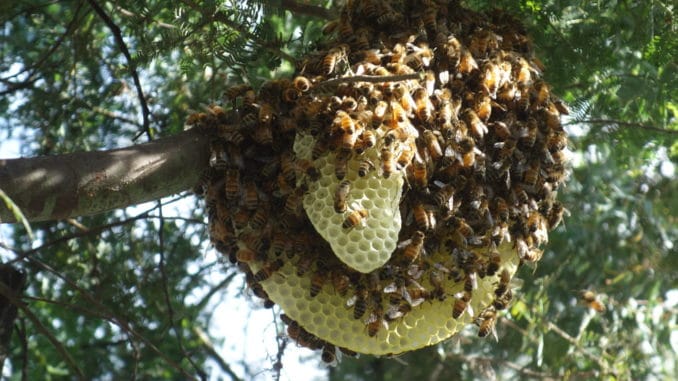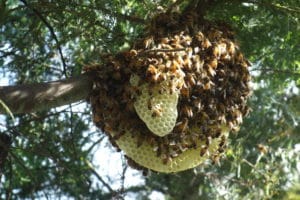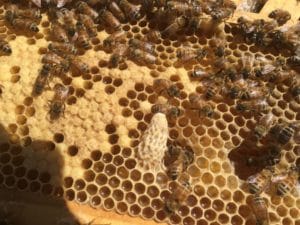
Should you prevent swarming?
While many natural beekeepers advocate allowing bees to swarm, and there is perhaps some merit in allowing them to do so [see Tom Seeley’s Darwinian Beekeeping Seeley-2017-Darwinian-Beekeeping-An-Evolutionary-Approach-to-Apiculture], there is a very a very practical reason for not allowing them to buzz off. When spring swarms take off you can wave goodbye to the prospect of a good summer honey crop. Another reason to prevent bees swarming is to factor in the nuisance value that they present to your neighbours. There is also the reality that your neighbours may have to pay good money to have bees removed from walls and chimneys. For an apiary operating in a public space, as we do, preventing swarming is imperative both from a safety and public relations perspective. Buts let’s put this issue aside and ask ourselves: ‘Can we really and truly prevent swarming?’
 |
Long term resident nuisance swarm |
Can you always stop swarming?
In any good start to a beekeeping season, swarm control would appear nigh impossible. The spring 2016 season was such a time and bee management turned out to be particularly problematic. The season started well and swarming was widespread in south eastern Australia though conditions quickly deteriorated. Nothing seemed to flower and we all ended up with an abysmal honey crop. It was a truely swarmy swarm season and nothing came of the beekeeper’s best efforts.
The season of 2017-2018 was different. It started badly very early but quickly turned around to be a bumper honey year. So seasonal conditions beyond our control play a part and we should never assume we can fully control bees. If you are on hand and know what to do, every swarm season can be well managed. Problem is we are all busy and leaving the bees alone for any period longer than roughly a fortnight means that, in the normal course of events, your bees will likely swarm.
How to prevent swarming
Often I hear people say: ‘I cut out swarm cells to prevent swarming’. That doesn’t stop the bees. Their instinct is unchanged and they will simply raise a new batch straight away.
 |
A supersedure, not a swarm, cell indicated by there being only a few and in brood nest Leave this one as the bees need a new queen and it’s not a swarming signal. |
A series of two blogs will appear in the August and September club newsletter in Bee Buzz Box to show you how you can effectively intervene to prevent your bees swarming every year. These practices all release the pressure on the colony engine, the brood nest. If you are keen and want to jump the gun check out ‘Swarming in Honey Bees’ penned for The Australasian Beekeeper [Swarming in Honey Bees Part IA30062017 Swarming in Honey Bees Part IB 30062017 Swarming in Honey Bees Part II 18072017 Swarming in Honey Bees Part III 18072017 Swarming in Honey Bees Part IV 18072017]. Suffice to say we have adopted these practices at the club Jerrabomberra Wetlands Apiary and have had one swarm amongst twenty colonies over two full years.
Swarm prevention has meant that we reduced the amount of supplementary feeding we had to do in the summer before last and that it gave us a bumper harvest over the recent 2017-2018 season. From a member perspective this resulted in our being able to organise two club honey extraction days and that we had the chance to market wetlands honey under a smart new label designed by Inge Segal. Rumour has it that the club may now organise brewing a large batch of mead and that ‘someone’ may organise a beeswax candle and hand cream making workshop
Can I really expect to stop my bees swarming?
As George Demaree boldly proclaimed 125 years ago ‘You can do it without a doubt, by practicing my new system of preventing swarming: and if you have the ingenuity to apply proper management to suit the new condition, your surplus yield will be larger than by any other method heretofore made known to the public’. Of course the Demaree Plan is now well known and other measures – providing space, regular requeening, and splitting hives – have been added to the list of practical measures to arrest swarming.
Can you stop swarming?
‘Yes you can’.
Alan Wade

Be the first to comment